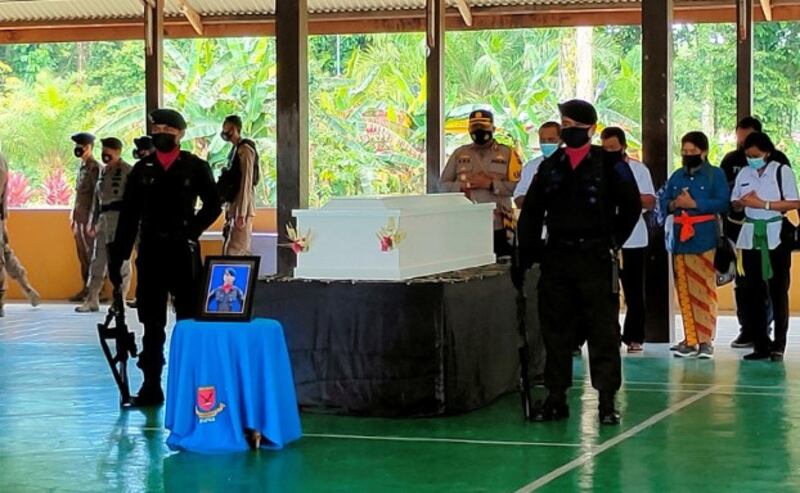Updated at 3:26 p.m. ET on 2021-07-23
Indonesian police arrested a Papuan separatist leader who was on the run after he escaped from a prison in Papua with several others in 2016, while serving a life sentence for the killings of three police officers, officials said Friday.
Osimin Wenda (also known as Usmin Telenggen) was picked up while riding a motorcycle in Puncak Jaya regency on Thursday morning, Papua province police spokesman Ahmad Musthofa Kamal said.
“The team stopped him in the Wandigobak village and immediately arrested him,” Kamal told BenarNews in a statement.
Osimin, 30, was arrested in 2013. The next year, a Papua court sentenced him to life in prison after finding him guilty of premeditated murder, aggravated robbery and arson attacks.
Kamal said his crimes included participating in an attack on a police station in Lanny Jaya regency that killed a local police chief and two of his subordinates in November 2012.
During the same month, Osimin and other rebels ambushed an entourage led by then-Papua police chief Tito Karnavian – now Indonesia’s minister of home affairs – in Lanny Jaya, Kamal said. There were no casualties.
Five years ago, Osimin and 13 other inmates, including several separatist rebels, escaped from the Abepura prison in Jayapura, the provincial capital. Authorities blamed the prison break on a shortage of guards.
While on the run, Osimin allegedly was involved in an attack that killed a motorcycle taxi driver in Lanny Jaya regency in 2018, Kamal said.
Sebby Sambom, a spokesman for the West Papua National Liberation Army, the armed wing of the Free Papua Movement, could not immediately be reached for comment on the arrest.
Before his first arrest in 2013, Osimin was part of a group of guerrillas under the command of Lekagak Telenggen, a rebel chief in Puncak regency.
Earlier this month, security forces arrested an alleged guerrilla, Yoniku Murib, and four others under Lekagak’s command.
While being interrogated in custody, Murib revealed that the Lekagak Telenggen group was responsible for some attacks in Puncak this year, according to Faisal Ramadhani, director of general crime investigations at the Papuan police.
A low-level separatist insurgency has simmered for decades in Indonesia’s far-eastern Papua region, which makes up the western half of New Guinea Island and comprises two provinces: Papua and West Papua.
In 1963, Indonesian forces invaded Papua and annexed it. The region, whose population is mainly Melanesian, was incorporated formally into Indonesia after a U.N.-sponsored ballot called the Act of Free Choice in 1969.
Locals and activists said the vote was a sham vote because only about 1,000 people took part. However, the United Nations accepted the result, which essentially endorsed Jakarta’s rule.
The natural resource-rich region remains among Indonesia’s poorest and underdeveloped ones.

Police honor guards stand near the coffin of one of their officers in Mimika, Indonesia, a day after he was killed in a gun battle between police and separatist rebels in the Papua region, April 28, 2021. [AFP]
Recent violence
Kamal said the security situation had improved in Papua after a spate of rebel attacks on civilians and clashes between insurgents and security forces in the past few months.
“Thank God, the past few days have been calm,” Kamal said.
“Investigations, arrests and operations to hunt armed criminal groups are still being carried out by joint forces.”
In the latest incidents, rebels opened fire on security personnel who were guarding food supplies in Nduga regency on July 6, wounding three soldiers, Jayapura military commander Brig. Gen. Izak Pangemanan told the state-run Antara news agency.
On July 11, a police officer was wounded in a shootout with insurgents in Yahukimo regency. A day later, two soldiers were injured in a shootout with another group of rebels in Nduga, said regional military chief Maj. Gen. Ignatius Yogo Triyono.
Late last month, suspected separatist rebels killed four construction workers and took four people hostage in Yahukimo regency. Police said the hostages were later freed.
In April, President Joko “Jokowi” Widodo ordered security forces to step up efforts to eradicate the armed groups after separatist insurgents assassinated an army general, who was also the regional chief of Indonesia’s intelligence agency.
As part of the crackdown, the government declared the separatist rebels a terrorist group. The designation alarmed rights activists who said it could lead to more human rights abuses against Papuan people.
Cahyo Pamungkas, a researcher on Papua at the Indonesian Institute of Sciences, said the designation of separatists as terrorists meant that dialogue was increasingly out of reach.
“The result is that the authorities will become more and more overzealous in anti-insurgency operations. There are no more overtures for dialogue and violence and military force has become a solution,” Cahyo told BenarNews.
